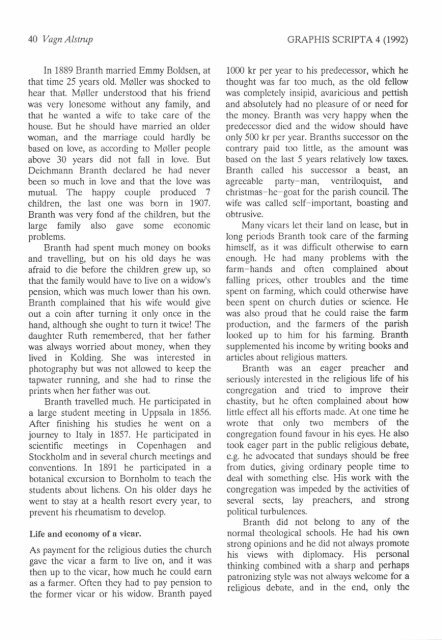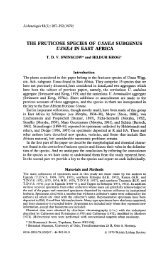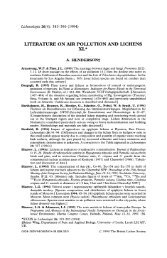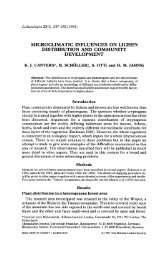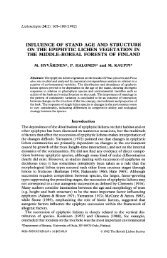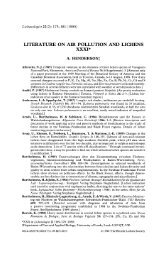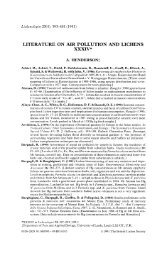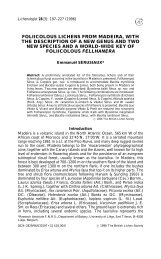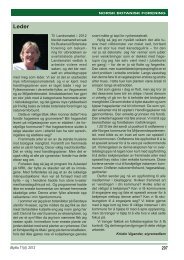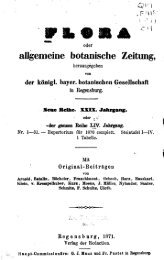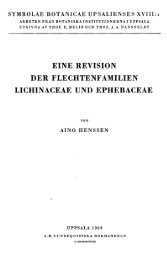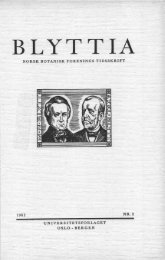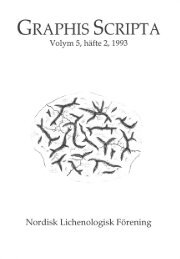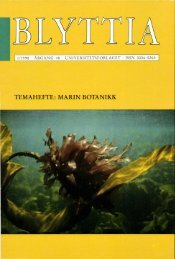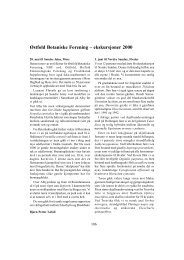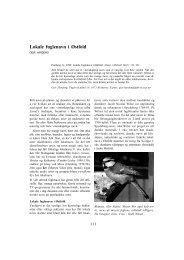GRAPHIS ScnIPTA - Universitetet i Oslo
GRAPHIS ScnIPTA - Universitetet i Oslo
GRAPHIS ScnIPTA - Universitetet i Oslo
You also want an ePaper? Increase the reach of your titles
YUMPU automatically turns print PDFs into web optimized ePapers that Google loves.
40 Vagn Alstrup<br />
In 1889 Branth married Emmy Boldsen, at<br />
that time 25 years old. MOller was shocked to<br />
hear that. Mgller understood that his friend<br />
was very lonesome without any family, and<br />
that he wanted a wife to take care of the<br />
house. But he should have married an older<br />
woman, and the marriage could hardly be<br />
based on love, as according to Moller people<br />
above 30 years did not fall in love. But<br />
Deichmann Branth declared he had never<br />
been so much in love and that the love was<br />
mutual. The happy couple produced 7<br />
children, the last one was born in L907.<br />
Branth was very fond af the children, but the<br />
large family also gave some economic<br />
problems.<br />
Branth had spent much money on books<br />
and travelling, but on his old days he was<br />
afraid to die before the children grew up, so<br />
that the family would have to live on a widow's<br />
pension, which was much lower than his own.<br />
Branth complained that his wife would give<br />
out a coin after turning it only once in the<br />
hand, although she ought to turn it trvice! The<br />
daughter Ruth remembered, that her father<br />
was always worried about money, when they<br />
lived in Kolding. She was interested in<br />
photography but was not allowed to keep the<br />
tapwater running, and she had to rinse the<br />
prints when her father was out.<br />
Branth travelled much. He participated in<br />
a large student meeting in Uppsala in 1856.<br />
After finishing his studies he went on a<br />
journey to ltaly in 1857. He participated in<br />
scientific meetings in Copenhagen and<br />
Stockholm and in several church meetings and<br />
conventions. In 1891 he participated in a<br />
botanical excursion to Bornholm to teach the<br />
students about lichens. On his older days he<br />
went to stay at a health resort every year, to<br />
prevent his rheumatism to develop.<br />
Life and economy of a vicar.<br />
As payment for the religious duties the church<br />
gave the vicar a farm to live oo, and it was<br />
then up to the vicar, how much he could earn<br />
as a farmer. Often they had to pay pension to<br />
the former vicar or his widow. Branth payed<br />
<strong>GRAPHIS</strong> SCRTPTA 4 (reez)<br />
1000 kr per year to his predecessor, which he<br />
thought was far too much, as the old fellow<br />
was completely insipid, avaricious and pettish<br />
and absolutely had no pleasure of or need for<br />
the money. Branth was very happy when the<br />
predecessor died and the widow should have<br />
only 500 kr per year. Branths successor on the<br />
contrary paid too little, as the amount was<br />
based on the last 5 years relatively low taxes.<br />
Branth called his successor a beast, an<br />
agreeable party-man, ventriloquist, and<br />
christmas-he-goat for the parish council. The<br />
wife was called self-important, boasting and<br />
obtrusive.<br />
Many vicars let their land on lease, but in<br />
long periods Branth took care of the farming<br />
himself, as it was difficult othenvise to earn<br />
enough. He had many problems with the<br />
farm-hands and often complained about<br />
falling prices, other troubles and the time<br />
spent on farming, which could othenvise have<br />
been spent on church duties or science. He<br />
was also proud that he could raise the farm<br />
production, and the farmers of the parish<br />
looked up to him for his farming. Branth<br />
supplemented his income by writing books and<br />
articles about religious matters.<br />
Branth was an eager preacher and<br />
seriously interested in the religious life of his<br />
congregation and tried to improve their<br />
chastity, but he often complained about how<br />
little effect all his efforts made. At one time he<br />
wrote that only two members of the<br />
congregation found favour in his eyes. He also<br />
took eager part in the public religious debate,<br />
e.g. he advocated that sundays should be free<br />
from duties, giving ordinary people time to<br />
deal with something else. His work with the<br />
congregation was impeded by the activities of<br />
several sects, lay preachers, and strong<br />
political turbulences.<br />
Branth did not belong to any of the<br />
normal theological schools. He had his o\tn<br />
strong opinions and he did not always promote<br />
his views with diplomary. His personal<br />
thinking combined with a sharp and perhaps<br />
patronizing style was not always welcome for a<br />
religious debate, and in the end, only the


